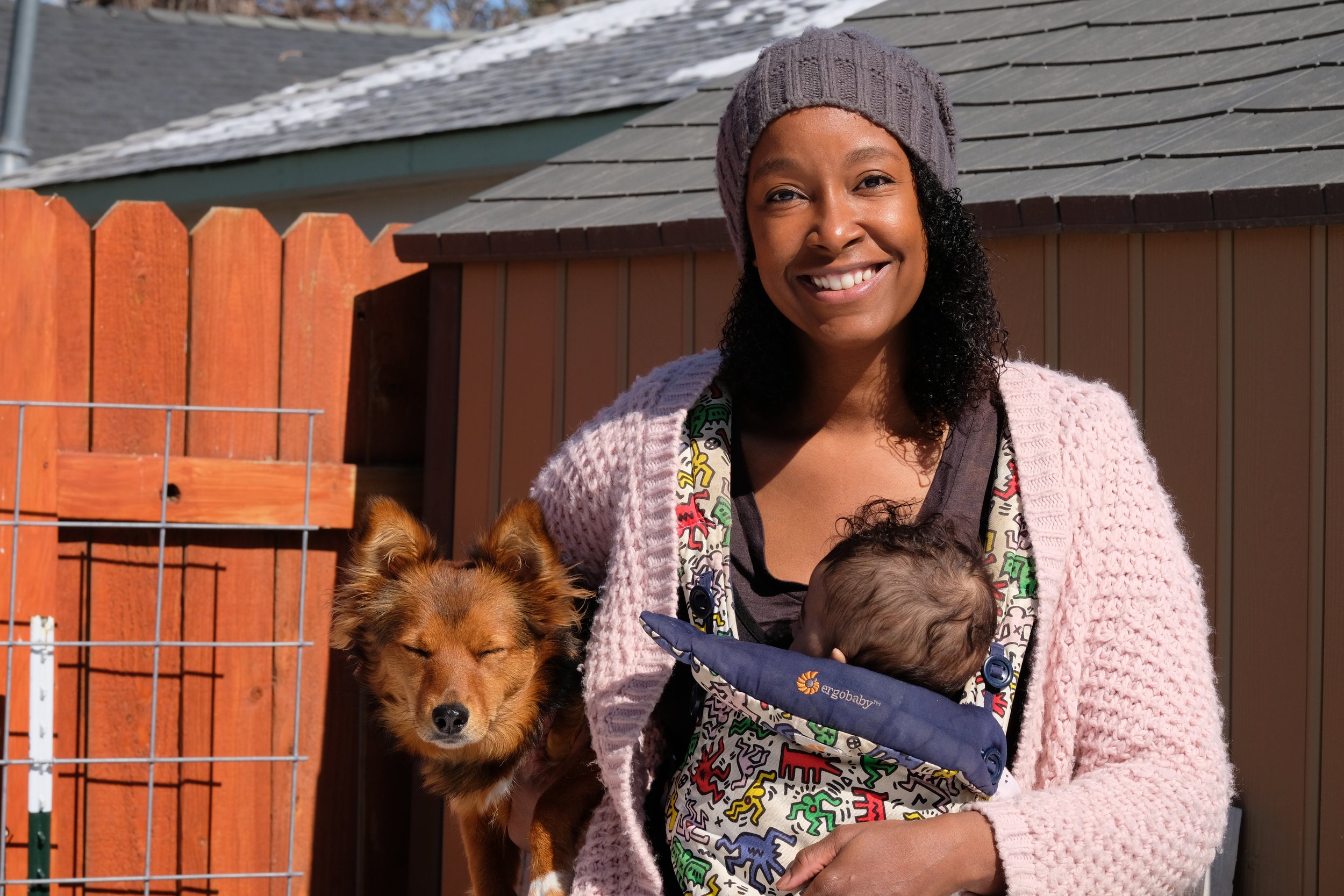Crystal Leon, the woman in charge of The Radish Hotel holds her baby, Nina in her baby carrier as she surveys some of the local inhabitants. The chicken coop is a small shed at the edge of the backyard. While the plants are more delicate to the cold, the chickens have been comfortable in their home.
In the backyard of a neighborhood home in Sparks there is a farmstead equipped with garden beds, a greenhouse and a chicken coop. This urban farm is called the Radish Hotel. It’s managed by the Leons, a couple who moved to Reno from the Bay Area.
Crystal and Carlos Leon run the farm with the help of their guardian dog Radish.
Last year, Nevada Governor Steve Sisolak, The Nevada Department of Agriculture and the National Association of State Department of Agriculture Foundation announced the selection of 10 Nevada women for the Farm2Food Accelerator program, including Crystal Leon.
The program is designed to help female farmers and entrepreneurs with food or beverage products. The Leons have been selling produce in boxes, including to isolated seniors. The Leons have also made a name for themselves with their highly sought after homemade granola.
The Farm2Food Accelerator program focuses on supporting women farmers who grow specialty crops for a value-added food, such as turning homegrown strawberries into jam.
“I’ve got a million things going on, but you know, at four o’clock on Wednesdays I’m like, ‘Okay, everybody out. It’s my time to learn something,’” Crystal said in regards to some of her current workflow.
On Wednesdays she meets online with more than 30 other women in the program, and they learn from industry experts. Some of the topics that they cover are packaging, marketing and pitching.
“I’m learning things that I didn’t even know that I had to learn in order to continue doing what I’m doing,” Crystal said. “I found it very helpful and just encouraging to be amongst a bunch of women killing it at what they’re doing.”
Crystal has been gardening and working in urban farms since she was in the Bay Area. She used to garden with her grandmother. In the San Francisco school district, she taught urban farming, gardening and nutrition.
When the Leons first moved to Reno, they had taken a break from farming. They moved to the area to be closer to Carlos’ parents because Crystal was pregnant with their now four-year-old daughter, Noel.
“We were here for a while, and just really missed what we were doing,” Crystal said. “We both love growing food and teaching, and it was just time to start something like that.”
According to Crystal, the Radish Hotel is still in the beginning stages and has only been running for three years. They’ve finally started getting a rhythm and learning how to grow in Reno’s climate.
The extreme dryness in the summer, and the frost and snow in the winter are new challenges they faced coming from the Bay Area.
The Radish Hotel does most of its growing inside of the greenhouse over the winter. Greenhouses can be up to 30 degrees Fahrenheit warmer than the outside temperature, and protects the plants from freezing temperatures.
While winter weather limits growing to the greenhouse, Crystal still has work, which can be more unpredictable.
The summer provides a consistent flow of things that she can expect. Their schedules in the summer are dedicated to harvesting and preparing for farmer’s markets in Fernley and Sparks, and changes to that schedule are rare. However, in the winter things are always changing.
“In the winter you don’t know when there’s gonna be a frost,” Crystal said, referring to sudden snowfall after warm temperatures in Reno, a frequent occurrence in March. “Those are things that pop up and we have to kick it into gear to prepare for them.”
Other challenges that the Leons have faced are predatory animals. These range from raccoons to hawks.
“We’ve had three chicken destroyed by hawks,” Crystal said. “[And] we had to create a sort of nighttime locking system because of raccoons.”
As the Leons learned more about how animals targeted their chicken, they moved their chicken coop and added wires as extra protection. Another form of protection for their livestock has been Radish, their dog. “She stopped our youngest chickens from getting taken away and destroyed by a hawk,” Crystal said. Radish isn’t always outside, but does her job to protect the chickens when she is able.
Despite the challenges, the Leons have worked hard at living a self-sustainable lifestyle through urban farming. Crystal hopes that people see what she’s doing and become inspired by it.
As an urban farmer, she’s met many people who have had the idea of starting their own homestead, but don’t know how to start.
“Stop over analyzing and just start growing something,” Crystal said. “Start small and work from there.”
Starting an urban farm doesn’t have to be expensive or big from the beginning. Crystal is proud to say that many of the items for her farm are used and repurposed from Craigslist and Facebook
“There is so much junk out [there] that’s going into the landfill,” Crystal said. “And if we can save it from going there and make good use out of it, that’s absolutely what we’re doing.”



